January 28, 2015. I’ll never forget this day. It was the day my cat, Nancy Bird, died. He was two.
We (my husband and I) don’t know what led him to his death, and probably will never know. All we know is that he likely fell from one of the top floors of our building (we last saw him at the 9th floor before we went for our jog; an hour later we found his body on the ground floor). It’s either that (1) he slipped and fell by his own carelessness (quite unlikely), (2) he was surprised by someone/something and slipped and fell, or (3) someone pushed him off the building. We shudder to even consider the third possibility.
As we handled his dead body, all I could see was that he was completely motionless. The gentle expansions and contractions of his small body that I had come to associate as part of everyday living as I watched him sleep each night were no more. This is Nancy, the sweet human-like cat whom I had almost come to see as my child. Towards the final two months of Nancy’s life, Ken and I would often talk about our future with him in it. We would talk about how we were going to bring Nancy with us should we move house. We would talk about bringing Nancy to a new park, using the new cat carrier that we bought specially for him, so that he could explore a new place. I would always visit the pet shop every few days, looking at new treats and food to get for Nancy.
But no more.
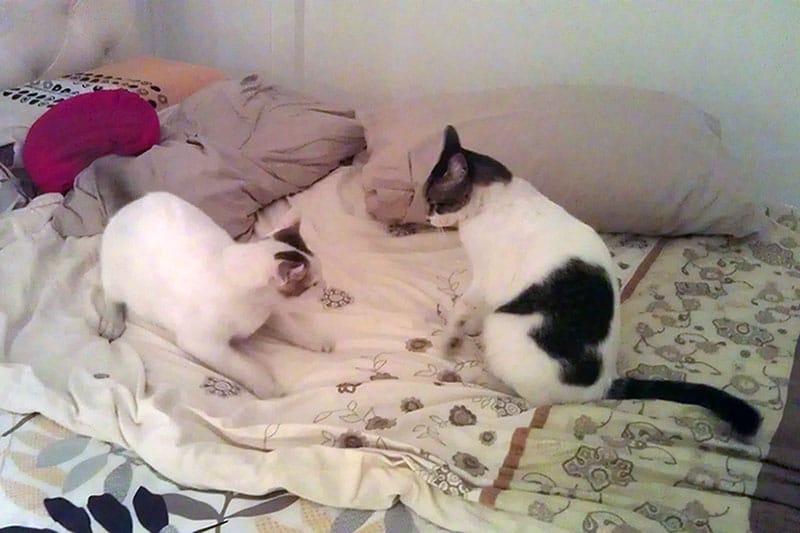
Nancy and Kiki, two brothers in one of their usual sparring sessions. That’s Nancy on the right… ♥
For those of you who don’t have a pet, today’s post on how to cope with pet loss will probably be meaningless. You need not read any further. But for those of you who have a pet and/or lost a pet before, I hope this post will be of some value. Death comes to all living beings. For our little furry (or non-furry) ones, it just happens that they have a shorter natural life span than us, which means the odds are we’ll have to deal with losing them at some point in our life. Today, I share 8 tips to help you to cope with your pet passing away.
(For simplicity, I’ll be using the pronoun “it” for pets in this article. However, know that I acknowledge your pet as a complete living being, just like you and me.)
1) Decide what to do with your pet’s body
The common options are to (1) bury your pet, (2) cremate, and (3) dispose of the body in the trash bin. If you have a backyard or a garden, you can bury your pet there. For cremation, vet clinics should have this service, so check with them directly. Pet crematories are another option (in Singapore, there are Pets Cremation Center, Pet Hotel, and Mobile Pet Cremation). As for option #3, if your pet has been with you for a good period, I believe it deserves a better sending off than being dumped into the bin.
For Ken and me, we chose to bury Nancy. We picked a private spot near our home, where the birds hang out and the sun shines brightly in the day — very fitting for him as he loved chirping at birds (yes, he could chirp like a bird!) and bathing in the sun. Ken, using non-existent gardening equipment, dug away for a good hour in the wee hours of the night before we finally set him into the ground with his favorite toy, some cat food, a wooden plank as his afterlife scratch post, and some water.
2) Give yourself time to grieve
Please ignore the people who tell you to “move on,” “cheer up,” or “get a new pet” when the news of your pet’s death has barely set in. I’m not saying that their advice is bad. They likely have the best intentions. But you need to give yourself time to grieve before thinking about “moving on.”
Do you know the five stages of loss? First proposed by Elisabeth Kübler-Ross in her 1969 book “On Death and Dying,” they are:
- Denial — Where the person imagines a false, happier reality, such as imagining his/her pet is still alive.
- Anger — Where the person, in realizing that this false, happier reality cannot exist, experiences anger at the world or even him/herself. “Why is this happening? How can God do this to me?”
- Bargaining — Where the person tries to bargain with a higher power, such as a vet or even God, to improve the situation. “What if I do X? Perhaps he/she will come back?” “Can you bring him/her back through XXX?”
- Depression — In realizing that the death is a fact, the person sinks into a state of sadness. He/she may isolate him/herself from the world to mourn and grief.
- Acceptance — The person embraces that mortality and his/her pet’s death are a part of life. He/she begins to move on.
While these stages do not necessarily come in order (someone can jump from stage 1 to 4 then to 3), nor are all stages experienced by everyone, Kübler-Ross states that a person always experiences at least two of the stages. IMO, one has to fully work through the first 4 stages (whichever stages that apply) before reaching the “Acceptance” stage. Yet, because many take “Acceptance” as the ultimate end goal, they rush to get there without properly grieving. They force themselves to “accept” their loss when they’ve yet to deal with their emotions. They pretend to be happy and engage in mood-lifting activities when they’re still deeply aggrieved about their loss.
Please take time to properly grieve. I can’t tell you what’s the appropriate length of time; only you can decide. Your relationship with your pet is unique to both of you and there shouldn’t be any benchmark of an appropriate length. For some it can be weeks; for others it can be months; for those who had their pets from the day they were born all the way till their death, the grieving may well take a year or more.
For us, we only had Nancy for 6 months, yet the loss is real. I cried each day for the first 3 days; Ken also teared during this period. While I slowly worked on moving on after that, not a week goes by when I wouldn’t casually comment to Ken about how I miss Nancy and some random thing about him. I do this even today, 3 months after his death. I doubt I would ever stop talking about Nancy; he lives on forever in our hearts.
3) Revisit and celebrate memories of your pet
One of the steps that helped me to process my grief is revisiting my memories of Nancy and celebrating them. While Nancy was alive, we recorded a good number of video clips and took many pictures of him and his brother Kiki. After he died, especially in the first week, I watched these clips and reviewed the photos with Ken several times a day, to cherish our happy memories together. For every clip and every photo, I would recall the moment it was taken and feel grateful for it. I do this from time to time even today to celebrate our good times together.
I also started this list of Nancy’s traits and idiosyncrasies that made him so special, as part of honoring him and keeping him in our memory. For example, he had this special hiding spot at the second floor of our building where he would hang out and “sun bathe” every afternoon. He would walk us out whenever we left home and would wait by the stairs till we returned home each night. We truly believe he had a human consciousness, in that he had a very high level of awareness and seemed able to understand us. Whenever I spoke to him, he would respond with single, double, or triple meows and with varying intonations (depending on what I said). Every night, I would have a mini-conversation with him where I would say random things and he would respond to each line.
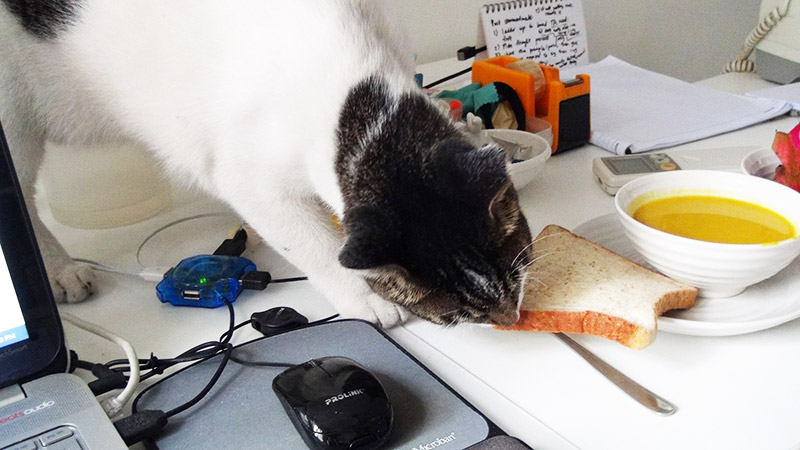
Him sneaking a bite out of my bread. This was during the 14-Day Healthy Living Challenge this year. :)
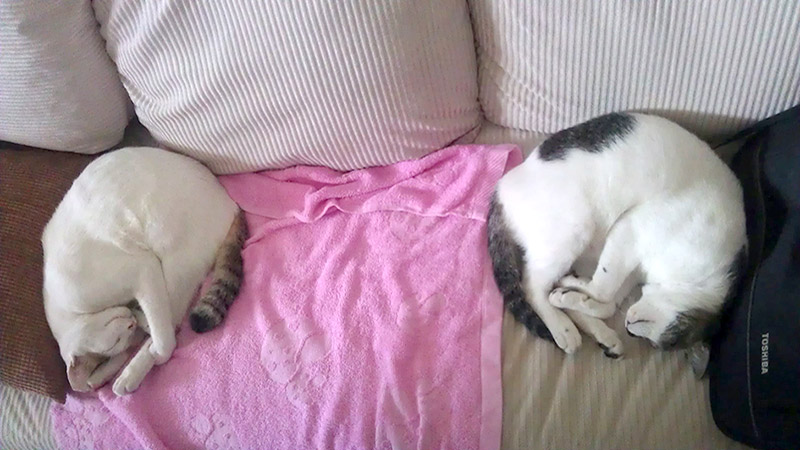
The brothers sleeping on the sofa. :) We noticed that they would always be in positions that “mirrored” each other, like here.
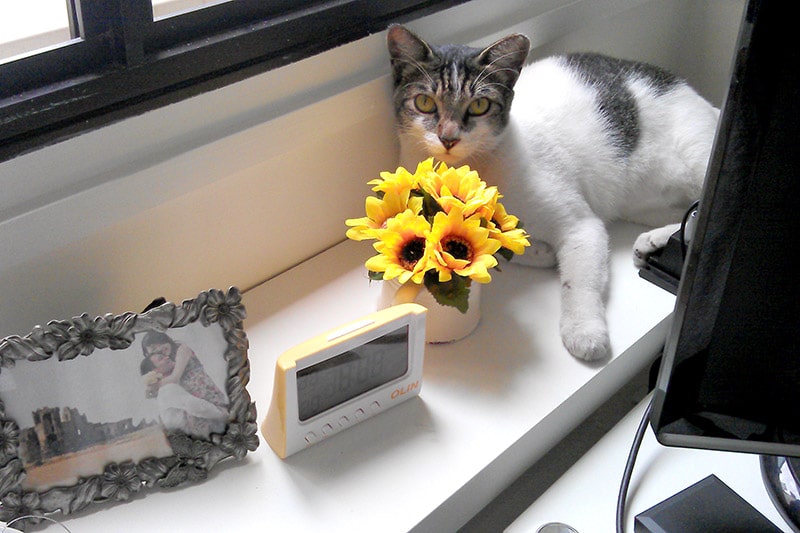
Nancy at my work desk, by the window. He liked this spot for the sunshine. :)
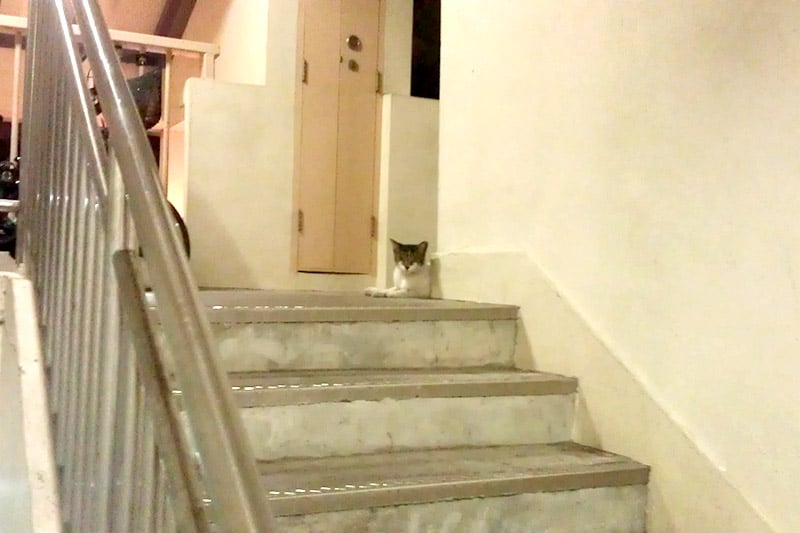
Nancy would wait by the stairs for us to come home each day
As you grieve your loss, revisit your past memories of your pet:
- What do you love most about your pet? Pen these down in a list.
- What made it so special to you? Add them to the list too.
- Any videos and photos you took of/with your pet that you can look at, as you celebrate memories of it?
- Where were its favorite spots and play areas? Revisit them and soak in good memories of/with it.
As you recall each memory, don’t rush through the recollection process. Play the memory thoroughly in your mind and try to remember as much of it as possible. Cherish that moment you had with your little one. Soak in the emotion you felt at that time, be it happiness, annoyance (at your pet, if it did something wrong), laughter, or sadness. Be grateful that you had this opportunity to experience this with it. Then process the next memory.
4) Know that it isn’t your fault
Some of you may blame yourself for your pet’s death, even when it has nothing to do with you. For example, I had a business friend, P, who blamed himself when his dog died, even though she died of old age. That’s because on the day she died, he rushed out of home for work instead of hugging her goodbye like he usually did. His dog passed away later that day. P was aggrieved beyond words. He couldn’t believe that his beloved pet’s last memory of him was him rushing off for some “stupid work” as opposed to hugging her and showing her affection.
In our coaching conversation, I told P that while it was unfortunate that he didn’t get to hug his dog in their final interaction, his dog’s memory of her life isn’t going to be made up of just that one memory. After all, she lived to a ripe old age of over 10 years, almost all of which were with P. How on earth would 10 years of happy memories be surpassed by that one moment where he didn’t hug her, because he had to go to work? This was even assuming that his dog felt upset at all, when she most likely — as a cognizant being with a deep relationship with her owner — understood that P didn’t hug her because he had to go to work, and not because he didn’t love her. Hearing this, P felt his grief lessen as he realized his self-blame was unwarranted, and simply an expression of his love for his dog.
For me, in the initial days, even weeks, after Nancy’s death, I had to reconcile that Nancy’s death wasn’t my fault. That’s because I kept wondering,
- What if…?
- What if we didn’t go jogging? Because I was the one who suggested jogging to Ken, after which we went to jog — and the cats then followed us out of the apartment as they always would. Otherwise, they would be resting in our home and the fall would have been adverted.
- What if we just took the cats into the lift as opposed to letting them roam the corridors? Then there would have been no fall to speak of.
- What if I returned home straight after my jog, as opposed to accompanying Ken to get his dinner? I could have reached home before the ill-fated fall happened, and perhaps adverted Nancy’s death.
While either of these actions would have most likely adverted Nancy’s fall and thus death, the most important thing was to recognize that I’m not a fortune teller and neither I (nor Ken) could have predicted that Nancy would die that night. As Nancy’s semi-owner (he was a stray who would regularly visit our home; same for Kiki), we did the best we could, within the context of our situations. While we would do anything to bring him back, the reality is that Nancy is gone, and blaming myself isn’t going to bring him back. And I believe that Nancy wouldn’t want us to blame ourselves either.
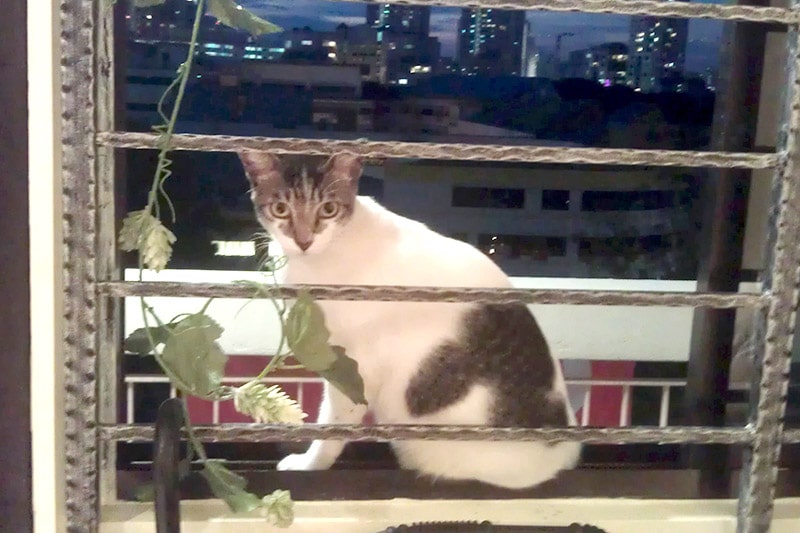
Nancy perched by the window. He always liked to jump on platforms and higher ledges to get a better view of the world. I always felt that his eyes were very beautiful, dark with a black rim around them.
Perhaps you are blaming yourself for your pet’s death. Maybe you’re thinking, What if… ?, and the million other things you could have done to keep his/her alive.
However, recognize that death is a part of life, including death by accidents, illnesses, and old age. While you can try to account for every single possibility and detail, there are things you cannot be held responsible for ultimately. Know that sometimes, death is just a natural path that needs to happen. The best thing you can do then is to accept death, even accidental death, as part of life, grieve properly (i.e. by giving yourself time to grieve and properly processing your emotions), and then start the process of moving on.
5) Do not get a rebound pet
This will probably go against some advice on pet loss out there, but I do feel quite strongly about this. Please don’t get a rebound pet to help you transition out of your grief.
Why? Because firstly, I see it as just an easy way out to avoid dealing with the feelings of grief that come with loss. Secondly, I believe a living being should be treated as a unique being, as opposed to someone else’s rebound. This includes animals. Thirdly, and perhaps most importantly, if your pet was as important to you as you claim it was, then perhaps you want to spend some time grieving, properly honoring it and cherishing your memories of it, as opposed to getting a new pet right away to block out your feelings of loss.
Does it mean you can’t ever get a new pet? No, you can. Just make sure that when you do so, it’s because you wish to have a new pet and you are ready to care for it as it, NOT because you miss your old pet and you want a new pet to help you cope with your loss. Chances are, you will treat your new pet the way you used to treat your old one, and you will expect it to behave and react the way your previous pet used to — which will not only be unfair to your new pet, but will likely lead to frustrations between both of you as it fails your definition of a “perfect” pet. Furthermore, what if your new pet is completely different from your old pet, even defiant — what are you going to do with this? Put it back to the shelter? Give it up? No way! Having a pet is an important responsibility, and just like you have delicately cared for your previous pet while it was around, any new pet you take in deserves to be cared for as a unique being, not to fill in another’s shoes.
6) Know that your pet is in a better place
My personal belief about life/death is that there is an afterlife. We are spiritual beings here with a physical existence, and when we die, our souls live on. For some of us, our souls reincarnate with new physical bodies. For others, our souls may remain as formless spirits to continue our higher path.
It’s the same for pets. For Nancy, I believe he is in a better place. Because he was such a different cat, in that he was more of a human than a cat through his human-like mannerisms and his high consciousness, Ken and I believe that he probably died before his time so that he can transit to his higher path. His soul was too big for his cat body, if this makes sense. Most likely, his next life will be a human. And perhaps as our child if Ken and I ever have kids — who knows?
For your pet, I believe it has had a good life. After all, both of you got to cross paths and it got to be with you. :) I’ve no doubt that you’ve cared for it the best you could while he was around, and it was well loved. Now that it has died, it’s time for it to move to a better place and start a new phase of life. Trust that it is now in a better place, and that you couldn’t have done more during his/her time on Earth. You already did what you could.
7) Know that your pet will always be a part of you / your life
Perhaps one reason why people find it hard to move on is because “moving on” to them means acknowledging that their pet is gone forever.
However, I prefer to see things in a different way. I feel that just because your pet is gone doesn’t mean that it is fully gone. After all, it was a part of your life before, and perhaps a big part of your life for some of you. Hence, it isn’t going to “disappear” from your life just because it is dead. Sure, its physical form is gone. Perhaps its food tray, pet food, pet sleeping bag, and litter box will be gone as well, if you do not intend to get a new pet. However, your pet lives forever — in your heart.
Think about it. Your memories are real. Your time together was real. Your happy moments together were real. And so is the relationship between the both of you. These things live on forever in us. They don’t just disappear or get eradicated just because the physical form of your pet is now gone.
Hence, beyond the initial feelings of grief, please don’t mourn the fact that it is gone. Rather, be happy that both of you got to cross paths and be a part of each other’s lives. While you could have had any other pet, you didn’t; similarly, while it could have had any other owner, it didn’t. Celebrate the fact that you had the opportunity to shower your pet with love and care, and that it got to touch you in such a special way (otherwise I’m sure you wouldn’t be reading this article on pet loss). This is a gift that you were granted and will continue to own throughout your life, even without your pet around.
8) Be ready to move on…
Finally, get ready to pick the pieces and move on.
If your pet had a consciousness (which I believe pets do), I believe it wouldn’t want you to grief for too long. I believe it’d want you to move on with your life and be happy.
One of the reasons why — I feel — us humans as a civilization grief over death is because most of us don’t know anything about the beyond. After all, we were born into this physical world and the only reality we are conscious of is this physical one. Hence, many of us think of the physical realm as the be-all and end-all of existence, and that when a living being is no longer of the physical realm, it is gone forever.
Yet, like I mentioned under point #6, I believe that we are spiritual beings living a physical existence at this moment. And that when we “die” in this realm, we don’t actually “die” — I believe our souls live on and move on to the after life. I believe the same for our pets as well.
Know that your pet’s soul lives on forever. It may not be on Earth anymore, but it is now in a better, higher place, as part of its trajectory through life. Perhaps it is now serving a greater role in the universe. Perhaps it has been reborn as someone else’s pet. Perhaps it is now one of your spirit guides (!). Perhaps it has even been reborn as a human! Whatever it is, it is working through its life path, and I believe your interactions with it must have helped it in its evolutionary path (just as its interactions with you must have helped you in your path as well).
As your pet progresses into its next life phase, it’s also time for you to move on. Time to remember your life’s message and to pursue it. Time to re-think your life goals and to work on them. Time to create your action plans for your long-postponed Quadrant 2 goals and to get cracking. Know that one of the best ways to honor your pet is quite possibly by living your life to the fullest and to use your memories of it to push you forward.
Know that moving on doesn’t mean forgetting your pet. Moving on means continuing to be who you are meant to be and to live the life you’re meant to live, while honoring your pet in the process. Because even though you’ve lost your pet physically, it’ll continue to have a special place in your heart that no other pet or human can replace. Remember, your pet lives on forever in the universe, and its physical death is merely a necessary step in its evolutionary path.
To all pet owners, cherish your pet(s) and love it (them) every day. Our time on Earth is limited, so there’s little reason to get sidetracked with material pursuits while neglecting the most important things — such as relationships, our personal growth, and our life purpose — in the process.
To you, if you just lost your pet recently, I empathize with your loss, truly. I hope the 8 tips here will help to guide you through this difficult process.
To Nancy, Mama and Papa will always love you. You may have left us physically but you will never leave our hearts. RIP Nancy Bird, we will always cherish you in minds and hearts… ♥
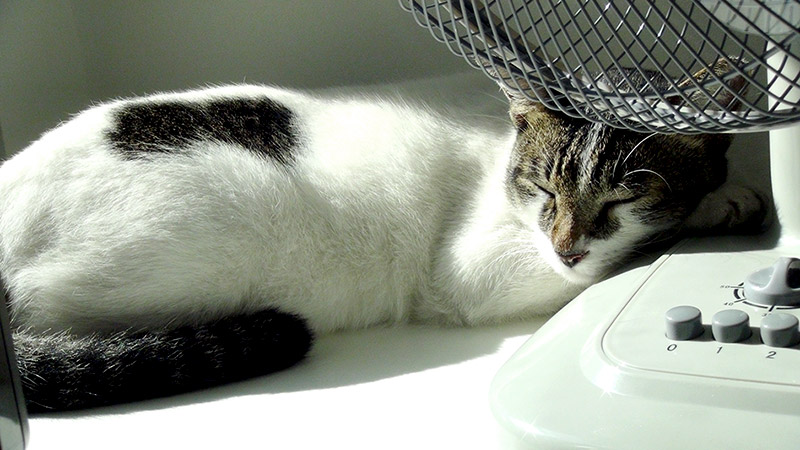
If you know someone who just lost a pet, pass this post on to them — it may help them through this dark time. Thank you. ♥









 Thanks for reading. If you like my free articles, join my private email list and get my latest updates and articles sent right to your inbox.
Thanks for reading. If you like my free articles, join my private email list and get my latest updates and articles sent right to your inbox.